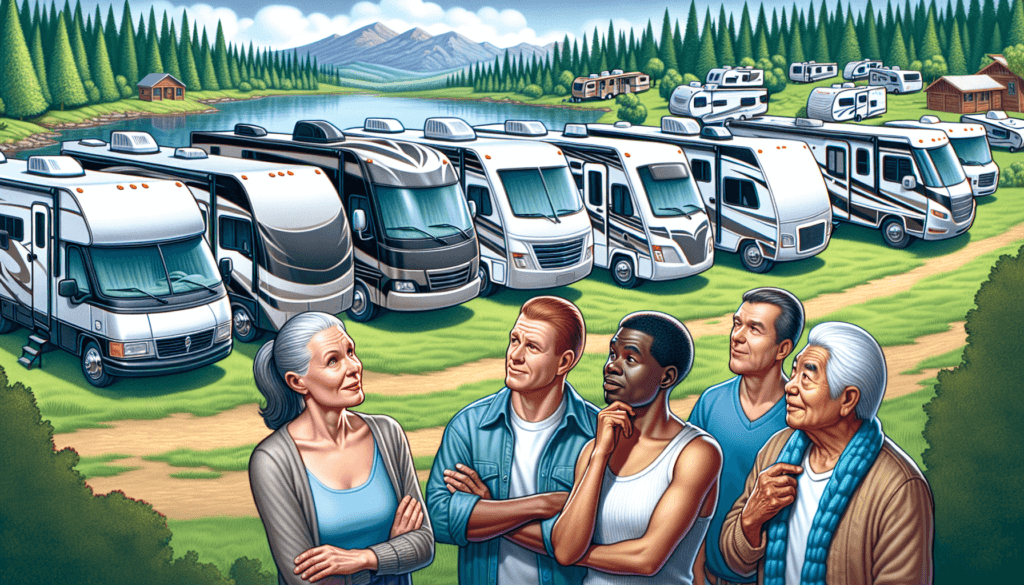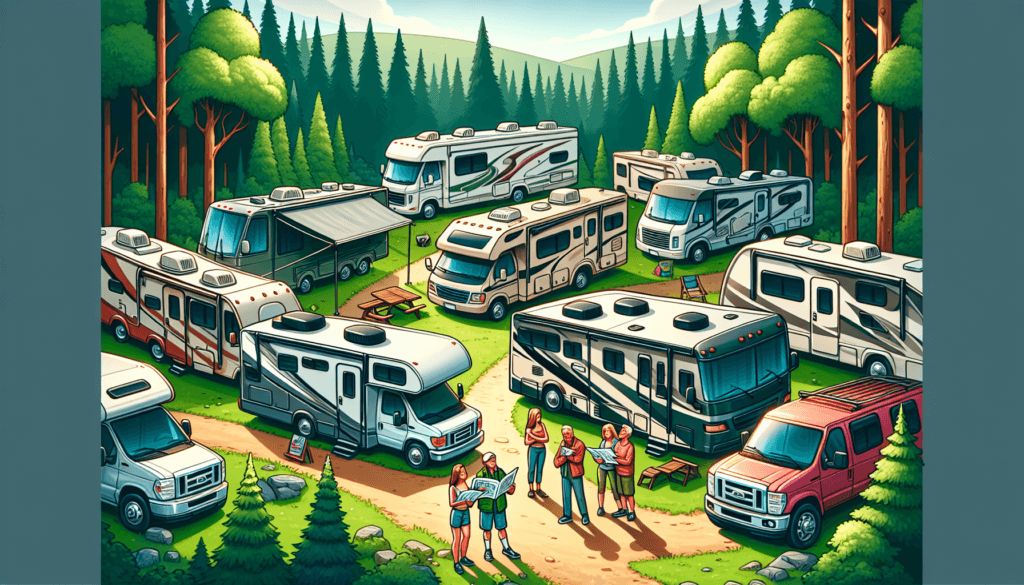So you’ve decided to embark on an exciting adventure into the world of RV camping, but now comes the pivotal decision of choosing the right camper. With an array of options available, it can feel overwhelming to figure out which one perfectly suits your needs. Whether you’re a solo traveler or a family, this article is here to guide you through the process of selecting the ideal camper that will make your RV camping experience memorable and enjoyable. From considering the size, amenities, and budget, to understanding the different types of campers available, this comprehensive guide will ensure that you make an informed decision and embark on your camping journey with confidence.

Budget Considerations
Used vs New
When considering the budget for your camper, one of the first decisions you’ll need to make is whether to buy a used or new camper. Used campers can often be found at a lower price point, which can be appealing for those on a tight budget. However, it’s important to carefully inspect a used camper for any issues or maintenance needs before making a purchase. On the other hand, new campers come with the advantage of warranties and the latest features and technologies, but they tend to come with a higher price tag.
Renting vs Buying
Another budget consideration is whether to rent or buy a camper. If you’re new to RV camping or only plan to go on occasional trips, renting a camper might be a more cost-effective option. However, if you’re planning to go camping frequently or for extended periods of time, buying a camper can be a worthwhile investment in the long run. It’s important to carefully calculate the costs of renting versus buying and consider your camping habits before making a decision.
Financing Options
If buying a camper is the right choice for you but you don’t have the cash upfront, financing options can be explored. Many dealerships offer financing plans with competitive interest rates, allowing you to spread out the cost of the camper over several years. It’s important to carefully consider the monthly payments and interest rates before committing to a financing plan, and to ensure that it fits comfortably within your budget.
Types of Campers
Motorhomes
Motorhomes are the most versatile and convenient option for RV camping. They come in three main classes: Class A, Class B, and Class C. Class A motorhomes are the largest and offer the most space and luxury, while Class B motorhomes, also known as camper vans, are smaller and more maneuverable. Class C motorhomes are a middle ground between Class A and Class B, offering a good balance of space and maneuverability. Motorhomes provide both living and driving spaces, making them a popular choice for those who value convenience and ease of travel.
Travel Trailers
Travel trailers are towed behind a vehicle and offer a variety of sizes and floor plans. They range from small and lightweight trailers to larger models with spacious living areas and multiple bedrooms. Travel trailers generally offer more space than motorhomes of the same size, as they don’t have to dedicate any interior space to the driving area. However, towing a travel trailer requires a suitable towing vehicle and some additional considerations, which we’ll delve into further in the Towing Capacity section.
Fifth Wheel Trailers
Fifth wheel trailers are similar to travel trailers but are designed to be towed by a pickup truck with a specialized hitch. They are known for their unique bi-level design, which typically features a raised master bedroom area over the truck bed. Fifth wheel trailers offer excellent stability while towing and can provide a more spacious living area compared to traditional travel trailers. However, their hitch setup requires a pickup truck with a suitable bed configuration, limiting the towing options for some campers.

Size and Space Requirements
How Many People Will Be Camping?
One of the most important considerations when choosing a camper is how many people will be camping with you. Campers come in various sizes, and it’s essential to select one that can comfortably accommodate everyone who will be joining your camping adventures. Keep in mind that some campers have convertible dining areas or bunk beds that can increase the sleeping capacity if needed.
Sleeping Arrangements
Consider the sleeping arrangements that will be most suitable for your needs. Some campers offer permanent beds with comfortable mattresses, while others have convertible sofa beds or dinette areas that can be transformed into sleeping spaces. Think about whether you prefer separate sleeping areas or if you’re comfortable with shared sleeping spaces. Additionally, take into account any specific requirements, such as the need for a separate bedroom for children or a designated sleeping area for pets.
Storage Space
Another aspect to consider is the storage space available in the camper. Depending on the length of your trips and the number of people camping, you may need ample storage for clothes, cooking equipment, outdoor gear, and other essentials. Look for campers with sufficient overhead cabinets, closets, and exterior compartments to accommodate your belongings. Also, consider whether the camper has additional storage options for larger items, such as bicycles or kayaks.
Towing Capacity
Understanding Towing Capacity
If you opt for a travel trailer or a fifth wheel trailer, it’s crucial to understand and match your vehicle’s towing capacity with the weight of the camper. Towing capacity refers to the maximum weight that a vehicle can safely tow. Exceeding the towing capacity can put unnecessary strain on your vehicle and compromise safety. Refer to your vehicle’s specifications or consult with a professional to determine its towing capacity before selecting a camper.
Matching Your Vehicle with the Camper
Matching your vehicle with the right camper involves considering not just the towing capacity but also other factors such as hitch compatibility, braking systems, and stability aids. Ensure that your vehicle has the appropriate hitch receiver and that it can accommodate the type of hitch required for the camper you’re considering. Additionally, consider installing a trailer brake controller if your vehicle is not already equipped with one, as this is essential for safely stopping a trailer.
Considerations for Different Camper Weights
Different campers have varying weights, and it’s important to take this into account when selecting a camper to tow. The weight of a camper includes not only its base weight but also the weight of any cargo, water, propane, and personal items that will be carried. Knowing the weight of the fully loaded camper is crucial for determining whether your vehicle can safely tow it. Consider getting the camper’s weight verified at a weigh station to ensure accurate information for your towing calculations.

Amenities and Features
Kitchen Facilities
The kitchen facilities offered by a camper can greatly enhance your camping experience. Consider whether you prefer a fully equipped kitchen with a stove, oven, microwave, and a large refrigerator or if a simpler setup with a stove and a compact fridge will suffice. Think about the type of cooking you enjoy and whether you’ll need adequate counter space for meal preparation. Some campers also offer outdoor kitchens, which can be a convenient option for cooking and enjoying meals al fresco.
Bathroom Facilities
Having a bathroom in your camper can provide a significant level of comfort and convenience. Determine whether you prefer a camper with a full bathroom, including a shower, toilet, and sink, or if a smaller wet bath with a combined shower and toilet will meet your needs. Consider the size of the bathroom and the amount of water storage available, as this will affect the length of time you can camp without needing to refill or empty the tanks.
Entertainment Options
While camping is often a chance to disconnect from technology and enjoy nature, having some entertainment options in your camper can be a nice bonus. Consider whether you’d like a camper with a built-in TV and DVD player or if you’re content with using a portable device for entertainment. Some campers also come with built-in stereo systems or exterior speakers, allowing you to enjoy music both inside and outside the camper.
Level of Maintenance
Simple Maintenance Tasks
Regardless of the type of camper you choose, there will be some level of maintenance involved. However, the complexity and frequency of maintenance tasks can vary. Consider whether you’re comfortable with simple maintenance tasks such as checking tire pressure, inspecting seals, and cleaning the camper’s exterior. These tasks are typically easy to learn and can be performed without professional assistance.
Regular Servicing and Inspections
In addition to simple maintenance tasks, campers also require regular servicing and inspections. This may include tasks such as checking and servicing the propane system, inspecting and maintaining the electrical systems, and ensuring the water systems are in good working order. Some campers also require annual inspections and maintenance of the brakes and wheel bearings for safety purposes. Consider whether you’re willing to invest the time and money into regular servicing or if you’d prefer a camper with lower maintenance requirements.
Cost of Maintenance
It’s important to factor in the cost of maintenance when choosing a camper. Newer campers often come with warranties that cover certain repairs and maintenance tasks for a specific period of time, relieving some of the financial burden. However, older campers may require more frequent repairs or replacements, which can add up over time. Consider your budget and ability to handle unexpected maintenance costs when making a decision.

Ease of Setup
Manual vs Automatic Setup
The ease of setting up your camper can greatly impact your camping experience. Manual setups generally involve tasks such as manually leveling the camper, extending slide-outs, and deploying awnings. While manual setups require more effort and time, they are often more budget-friendly and can be done without relying on technological systems. On the other hand, some campers offer automatic or hydraulic systems that make setup quick and effortless. Consider your preferences and the level of convenience you’re looking for when choosing between manual and automatic setups.
Time and Effort Required
Consider how much time and effort you’re willing to invest in setting up your camper. Manual setups can take anywhere from 30 minutes to a few hours, depending on the complexity of the camper and your experience level. Automatic setups, on the other hand, can be completed in a matter of minutes with the push of a button or the flip of a switch. Keep in mind that if you frequently change campsites or enjoy shorter trips, the time and effort required for setup may be a more important consideration.
Outdoor Living Space
The amount of outdoor living space offered by a camper can greatly enhance your camping experience. Some campers have spacious awnings or canopies that create a comfortable outdoor living area, perfect for relaxing, dining, or entertaining guests. Additionally, consider whether the camper has external storage compartments or features such as outdoor showers or grills that can further enhance your outdoor living experience. The availability of outdoor living space is especially important if you enjoy spending a significant amount of time outside the camper.
Length of Trips
Weekend Getaways
Consider the length of your typical camping trips when selecting a camper. If you primarily go on weekend getaways, a smaller camper may be sufficient, as you’ll likely spend most of your time outdoors exploring or participating in campground activities. However, if you prefer longer trips or plan to spend more time indoors, a larger camper with more amenities and space may be more suitable for your needs. It’s important to choose a camper that allows you to comfortably enjoy your desired camping style.
Long-Term Travel
For those planning to embark on long-term travel adventures, it’s crucial to select a camper that can withstand extensive use and extended stays at different locations. Consider features such as insulation, durability, and the availability of comfortable living and sleeping areas. Adequate storage space for belongings and provisions, as well as a reliable and efficient water, sewage, and electrical system, are important considerations for long-term travel.
Considerations for Full-Time RV Living
If you’re considering full-time RV living, there are additional factors to take into account. Look for a camper that offers maximum comfort and livability for long-term stays. Consider features such as a dedicated workspace, ample storage for personal belongings, and a layout that suits your daily routines. Furthermore, ensure that the camper is built to withstand consistent use and can provide a suitable home away from home.

Campground Facilities
Hookup Requirements
Different campgrounds offer varying hookup options, including electrical, water, and sewage hookups. Consider the type of camping you prefer and choose a camper that aligns with the most common hookup options. If you enjoy camping in more rustic or remote locations without access to hookups, selecting a camper with large holding tanks and sufficient battery capacity can ensure your comfort and self-sufficiency. On the other hand, if you primarily camp in campgrounds with full hookups, you may prioritize a camper with smaller holding tanks and a lighter battery setup.
Campground Size Restrictions
Some campgrounds have size restrictions for campers, particularly when it comes to length or height. It’s important to research and consider the size limitations of the campgrounds you plan to visit frequently before selecting a camper. Ensure that the camper you choose can be accommodated in the campgrounds you have in mind, allowing you to enjoy your camping experience without limitations.
Availability of Dump Stations
When selecting a camper, it’s crucial to consider the availability of dump stations for emptying your holding tanks. While some campgrounds offer on-site dump stations, others may require you to visit a nearby facility or find a designated dump station in the area. Planning your camping trips around the availability of dump stations can prevent inconveniences and ensure a smooth camping experience.
Safety and Security
Weight Distribution and Stabilization
Proper weight distribution and stabilization play a significant role in the safety of towing and camping with a camper. Ensure that you understand how to properly load and distribute the weight inside the camper to maintain proper towing balance. Some campers come with built-in stabilizers or leveling systems that enhance stability while parked. Furthermore, consider investing in additional stabilizing equipment, such as stabilizer bars or wheel chocks, to further enhance safety and minimize the risk of accidents or damage.
Security Features
Camping is a time to relax and enjoy the great outdoors, but it’s also important to consider the security of your camper and belongings. Look for campers that offer security features such as deadbolt locks, sturdy entry doors, and secure windows. Additionally, consider investing in additional security measures, such as hitch locks or alarm systems, to provide added peace of mind while camping.
Insurance Coverage
When choosing a camper, it’s crucial to consider the insurance coverage available for your specific needs. Insuring your camper protects against potential damages, accidents, or theft, providing you with financial security. Research and compare insurance options for your chosen camper, ensuring that the coverage meets your requirements and offers adequate protection. Consider factors such as the camper’s value, your intended use, and any additional equipment or modifications you may have.
In conclusion, choosing the right camper requires careful consideration of various factors. By assessing your budget, size and space requirements, towing capacity, desired amenities, level of maintenance, ease of setup, length of trips, campground facilities, and safety and security features, you can make an informed decision that suits your camping style and preferences. Remember to thoroughly research and test drive different campers, as a camper is not just a vehicle but a home away from home that will provide you with countless memories and adventures.


